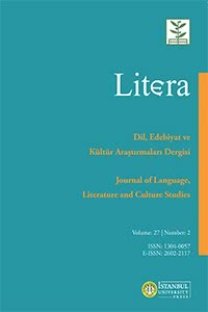Türkiye’de İş Yeri Adlandırma Uygulamaları: Yabancı Etkisi
Bu makalede, dilde yabancılaşmanın Türkiye’de iş yerleri adlandırma uygulamalarındaki etkisi araştırılmaktadır. Çalışmada yabancılaşmanın ve özellikle İngilizceleşmenin ülkedeki iş yeri adlandırma üzerindeki etkisinin artarak devam ettiği ve çeşitli yenilikçi ve yaratıcı yollarla kendini gösterdiği ortaya konmaktadır. Önceki çalışmalarda iş yeri adlandırmasında kullanılan yabancı unsurlar üç ana kategoride toplanmıştır: (i) İngilizce veya İngilizce olmayan (örn. Almanca ve Fransızca) yabancı sözcükler, (ii) Türkçe ve yabancı sözcük içeren hibrid unsurlar, (iii) İngilizce yazım kuralları kullanılarak yapay olarak yaratılan Türkçe sözcükler. Bu çalışmada ise mevcut uygulamalardan farklı olarak, ülkede yeni bir iş yeri adlandırma uygulaması olduğu gösterilmektedir. Ünsüz ikizleşmesi olarak adlandırılabilecek bu yeni uygulama, iş yeri adı olan sözcüğün ortasındaki ünsüzü kopyalamaktadır. Yeni oluşan sözcüğe bazen de İngilizce bir sözcük eklenmektedir. Bu yeni uygulama sözcüğün hem hece yapısını hem de telaffuzunu değiştirdiği için önemli dilbilimsel sonuçlar doğurmaktadır. Bu konuda yapılacak araştırmalar uygulamanın Türk dili üzerinde uzun vadeli etkileri olup olmayacağını saptamada faydalı olacaktır.
Business Naming Practices in Turkey: The Foreign Effect
This paper investigates the ongoing influence of foreign lexical elements and Englishization on the practice of naming businesses in Turkey. It is argued that the impact of foreignization and the English language on this business naming continues to increase and is manifested in various creative ways. The effect of foreignization and English on the Turkish business context, especially in shop-naming, has been widely discussed in previous researches. The consensus was that non-Turkish elements used in shop-naming could be classified into three major categories namely, foreign signs, hybrid signs and Englishized Turkish signs. In this paper, I demonstrate that in addition to the existing practices, there is a recent novel business naming practice in the country. This new strategy, which I call “consonant duplication” in this work, copies the consonant in the middle of the word and is sometimes accompanied by an English functional element. Interestingly, this has some important linguistic consequences because it changes both the syllable structure and the pronunciation of the word it applies to. Further research will reveal whether the practice will have certain long-term effects on the language.
___
Alkibay, S. (1996). Mağazalarda yabancı işletme adı kullanımına yönelik bir araştırma. [A study on the use foreign names in business places]. Türk Dili, 538, 415-422.Aydoğan, B. (2001). Türkçeye giren yabancı sözcükler ve otel adları. [Foreign words and hotel names in Turkish]. Türk Dili, 596, 144-154.
Büyükkantarcıoğlu, N. (2004). A sociolinguistic analysis of the present dimensions of English as a foreign language in Turkey. International Journal of Sociology and Language 165, 33-58. doi:https://doi.org/10.1515/ijsl.2004.006
Demircan, Ö. (2001). İşyeri adlarında yabancılaşma. [Foreignization of business names]. XIV. Dilbilim kurultayı bildirileri. Adana: Çukurova Üniversitesi Basımevi, 4-12.
Dimova, S. (2008). English in Macedonian commercial nomenclature. World Englishes, 27(1), 83-100. doi:10.1111/j.1467-971X.2008.00537.x
Doğan, İ. (1999). Sokaktaki yabancı-işyeri isimlerine yansıyan kültürel eğilimler. [Cultural inclinations reflected in foreign named business places on the streets]. Sistem Yayınları: İstanbul.
Doğançay-Aktuna, S. (1998). The spread of English in Turkey and its current sociolinguistic profile. Journal of Multilingual and Multicultural Development, 19(1), 24-39. doi:https://doi.org/10.1080/01434639808666340
Gözaydın, N. (2000). Türkçe bilinci ve karum [The awareness of Turkish and karum]. Türk Dili, 585, 227-231.
Haarman, H. (1984). The role of ethnocultural stereotypes and foreign languages in Japanese commercials. International Journal of Sociology of Language, 50, 101-121. doi:https://doi.org/10.1515/ijsl.1984.50.101
Kachru, B.B. (1992). Models for non-native Englishes. In B.B. Kachru (Ed.) The other tongue: English across cultures (pp. 48-74), Urbana/Chicago: University of Illinois Press.
Kachru, B. B. (1986). The alchemy of English: The spread, functions, and models of non-native Englishes. Urbana/Chicago: University of Illinois Press.
Kachru, B. B. (1982). The other tongue: English across cultures. Urbana, IL: University of Illinois Press.
MacGregor, L. (2003). The language of shop signs in Tokyo. English Today, 19(1), 18-23. doi:10.1017/S0266078403001020
McArthur, T. (2000). Interanto: The global language of signs. English Today, 16(1), 33-43. doi: https://doi.org/10.1017/S0266078400011421
Ross, J. N. (1997). Signs of international English. English Today, 13(2), 29-33. doi:https://doi.org/10.1017/S0266078400009597
Selvi, A. (2011). World Englishes in the Turkish sociolinguistic context. World Englishes, 30(2), 182-199. doi:10.1111/j.1467-971X.2011.01705.x
Selvi, A. (2007). A Multifactorial sociolinguistic analysis of business naming practices in Turkey. (Master’s Thesis, Middle East Technical University, Ankara). Retrieved from http://citeseerx.ist.psu.edu/viewdoc/download; jsessionid=3CE8ABCA0B636F1268B05EEDD8C448E6? doi=10.1.1.633.7105&rep=rep1&type=pdf
Stewart, P., & Fawcett, R. (2004). Shop signs in some small towns in northern Portugal. English Today, 20(1), 56-58. doi:https://doi.org/10.1017/S0266078404001099
Thonus, T. (1991). Englishization of business names in Brazil. World Englishes, 10(1), 65-74. doi:10.1111/j.1467-971X.1991.tb00137.x
Üstünova, M., Aydın, H., Çetinoğlu, G., Üstünova, K., Akkök, M., & Akgün, N. (2010). İş yeri adlarında türkçenin kullanımı.
[The use of Turkish in business naming]. Turkish Studies: International Periodical for the Languages, Literature, and History of Turkish or Turkic. 5(1), 1390-1419.
Üstünova, K. (1996). Bursa’da tabela adları. [Shop signs in Bursa]. Türk Dili, 533, 1186-1190.
Yaman, E. (1990). Ankara’daki iş yeri isimleri üzerine. [On shop signs in Ankara]. Millî Kültür, 79, 58-61.
- Yayın Aralığı: Yılda 2 Sayı
- Yayıncı: İstanbul Üniversitesi
Sayıdaki Diğer Makaleler
Yunan İlkokul Edebiyat Kitaplarında Türk İmajı
Türkiye’de İş Yeri Adlandırma Uygulamaları: Yabancı Etkisi
İngilizcede Birhan Keskin: Şiir Çevirisine Metafor Odaklı Bir Yaklaşım
Selanik’in İspanya Yahudileri (Yerleşme, Yükseliş, Büyük Yıkım)
Pavlos Matesis ve “Dilsizin Kızı” Eserinde Postmodernist Nitelikler, Milliyetçilik ve Öteki
